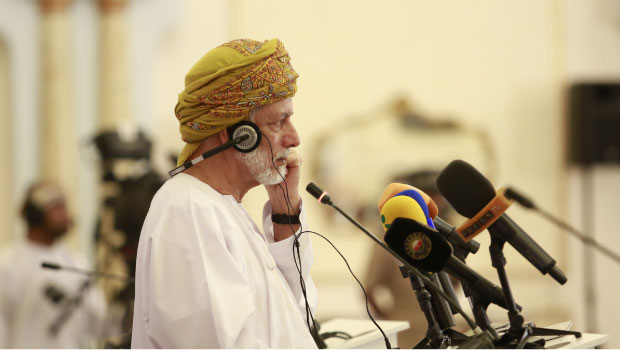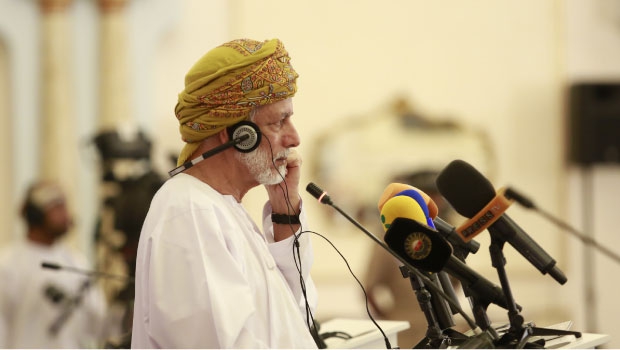 Minister Responsible for Foreign Affairs Yousuf bin Alawi bin Abdullah at a press conference in Muscat on Tuesday. PhotoCio Datta/Times of Oman[/caption]
Minister Responsible for Foreign Affairs Yousuf bin Alawi bin Abdullah at a press conference in Muscat on Tuesday. PhotoCio Datta/Times of Oman[/caption]Muscat: His Majesty Sultan Qaboos bin Said played a leading role in bringing together the Iranians and Americans in Muscat for meetings aimed at finding a solution to the Iranian nuclear problem, said Minister Responsible for Foreign Affairs Yousuf bin Alawi bin Abdullah.
"There were direct calls between His Majesty and the different leaders of the United States of America and the Islamic Republic of Iran. This has lead to an importance attached by the leaders of the two countries on taking these orientations," Alawi told journalists on Tuesday night in Muscat.
John Kerry, the American Secretary of State, Iranian Foreign Minister Mohammad Javad Zarif and the EU's Special Representative Catherine Ashton were in Oman on Sunday and Monday hoping to bridge the gaps between the West and Iran.
Four rounds of meetings in Muscat wrapped up on Monday night with some progress but no final agreement, but Alawi said Iran, the USA and the EU are closer than ever to finding a lasting solution
The Sultanate of Oman hosted the talks with the aim of providing a peaceful location for the exchange of ideas, thoughts and opinions, which are important for reaching common ground, bin Alawi explained.
He said this helped lay the groundwork for the agreement which is anticipated next week. The agreement is important for Oman because its vision of having regional and international peace, which is why so much has been invested in facilitating a rapprochement between Iran and the USA, he said.
"The Sultanate of Oman aims fully at making this region, the Gulf region and the Middle East in general, a place free of conflict," noted Alawi. He said those on both sides of the nuclear dispute shouldn't waste these opportunities but instead continue the efforts that have been exerted by both leaders to reach this situation, in which they were willing to have discussions in Oman before meeting in Geneva next week.
"The breakthrough will be followed by a situation of stability and cooperation on the regional and international levels and all the misunderstandings will (be) becoming friendships," said bin Alawi.
He said it wasn't his place to comment on the details of the discussions but he said he was optimistic that the agreement was within reach, a sentiment similar to that of Russian Deputy Foreign Minister
Sergei Ryabkov who also addressed the media earlier on Tuesday evening saying he's "relatively optimistic" that a lasting nuclear treaty with Iran can be signed by the November 24 deadline.
Speaking to media in Muscat during a break from the Iran, P5+1 talks among Iran, Germany and the five permanent members of the UN Security Council, namely China, France, Russian, the UK and the USA, he said unlike last year, this round of negotiations were aimed at finding "an agreement that should last for years."
The discussions have been going on in great detail on the levels of Iran's nuclear enrichment capabilities, how transparent Iran should be regarding its nuclear programme, and the speed with which Western sanctions on Iran would be lifted, Ryabkov explained.
The different aspects of the deal have to be considered as a package, not just as separate elements, he added.
"We are completely focused on these substantive issues and if by whatever reason, by whatever development we are not there, we will have time in the evening of the 23rd [of November] to develop an alternative, to develop a solution that would not kill the chances," said Ryabkov.
He said that would be the worst possible outcome, so the parties are working hard to achieve an agreement.
Despite the slow progress and the looming deadline, Ryabkov said the parties involved could "be there by November 24," adding that "The glass is half full; it's not half empty."
Russian and American differences over Ukraine would not prevent an agreement, either, despite the chilly encounter between Obama and Vladimir Putin at the APEC summit in Beijing.
As the November 24 deadline approaches, there is also the possibility that John Kerry could soon return to Oman if more trilateral talks are needed to find a solution to the ongoing negotiations on Iran's nuclear programme.
Earlier in the day yesterday German Foreign Minister Frank-Walter Steinmeier told media in Berlin that the situation "will be set back another two years" if a breakthrough isn't made.
By Times Of Oman
The Iran Project is not responsible for the content of quoted articles.











